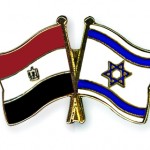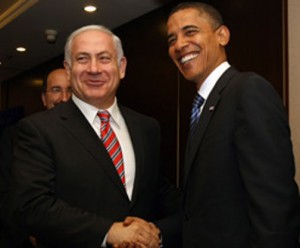Monday
Jul122010
Israel-Palestine Analysis: Netanyahu Manoeuvres with US & Egypt to Put PA in a Corner
 Monday, July 12, 2010 at 10:52
Monday, July 12, 2010 at 10:52  UPDATE 1030 GMT: Juan Cole has posted a complementary analysis, beginning with the Palestinian Authority's position, "Abbas: Israeli Colonization Impedes Start of Direct Talks".
UPDATE 1030 GMT: Juan Cole has posted a complementary analysis, beginning with the Palestinian Authority's position, "Abbas: Israeli Colonization Impedes Start of Direct Talks".Israeli Prime Minister Benjamin Netanyahu is talking about bringing the Palestinians on the table for direct talks. But how?
It is reported that, following consultations with some of his ministers, Netanyahu is thinking of announcing an end to Israel Defense Force operations in a number of Palestinian cities in the West Bank. Haaretz reports, from "senior officials", other confidence-building measures:
Gaza Latest: Amalthia to Break the Siege?, Ireland’s “Revenge”, Mavi Marmara Becomes a Hotel?
Israel-Palestine Dance-Off Video: Tik-Tok Soldiers & a Palestinian Response
- Israel will enable the Palestinian police to broaden its activities beyond Area A, which is under PA security control. They would be allowed to set up six new police stations in Area B, where the PA is currently responsible only for civilian affairs, and possibly also have some authority over civilian matters in Area C.
- Israel will lift more road blocks in the West Bank.
- Israel will transfer to Palestinian control a portion of land that is currently in Area C, under full Israeli control, in order to build a road connecting Ramallah and a new city currently in the planning stage, Rawabi.
With the Palestinian Authority under pressure from the Obama Administration to start the direct talks with Israel, Netanyahu is wisely trying to corner the PA and also other possible actors such as the Egyptian Government. PA leader Mahmoud Abbas rejected Obama's approach to change his mind, but Netanyahu, at his cabinet meeting on Sunday, stated that he planned to meet President Hosni Mubarak in Egypt on Tuesday to discuss how progress in negotiations can be achieved.
What is the benefit for Egypt? At a time when channels of dialogue are open with Hamas to some extent, following the Freedom Flotilla crisis, Cairo can use this initiative to push for Hamas flexibility in a Palestinian reconciliation agreement. It can boost its regional and domestic credibility by playing the role of second mediator between Ramallah and West Jerusalem.
Asked in an interview with Fox News whether there can be a Palestinian state by 2012 (a follow-up Palestinian leader Salam Fayyad's "A Palestinian State by 2011" statement), Netanyahu said:
I think there can be a solution. It may be implemented over time, because time is an important factor of getting the solution, both in terms of security arrangements and other things that would be difficult if they're not allowed to take place over time.
Can we have a negotiated peace? Yes. Can it be implemented by 2012? I think it's going to take longer than that.




